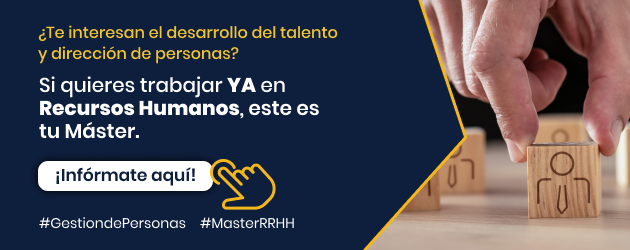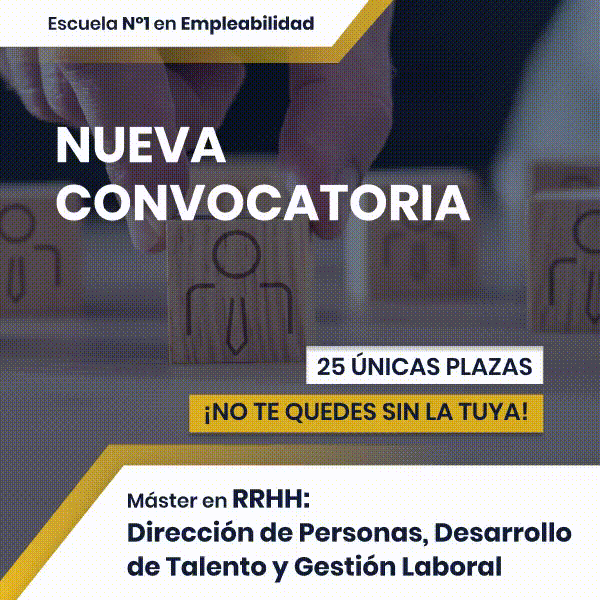We are pleased to introduce our new director of the Master of Human Resources Management. This is none other than Gema Campos, a Human Resources all-rounder who has worked both alone, offering coaching services to companies, as well as managing a team within large organizations.
Gema Campos has made a name for herself in the sector and is one of the leading women in Human Resources. As she tells us, she has always been linked to teaching in one way or another and now a new stage begins in which we can count on her in the day-to-day life of the EIP International Business School.
Welcome, Gema.

You studied Psychology at the UGR, were you interested in Human Resources from the beginning? What interested you most about this sector?
Not at all, I studied psychology like many classmates to understand how our brain worked and why we behave in one way or another. I wanted to know more about myself, help myself and be able to help other people. I have to admit that I was fascinated by clinical psychology, our mind seems so powerful to me... But when I finished my degree, I did become more interested in the world of organizations. I made my first master in HR and I started my internship at Manpower, and there I knew that this was my passion: finding the balance between profitability and well-being, between people and organizations.
After more than a decade working for companies such as Manpower, DÍA and Leroy Merlin, you began your solo career as a trainer and Coach for companies. Was it difficult for you to take this step?
Wow, what a moment that was. Taking the leap, I never would have imagined. It's more; I always thought that I did not have the necessary skills to undertake.
The truth is that, for me, it was a super disruptive change. After more than 15 years I decided to find a life and live from the new passion I had discovered: coaching. And well, the truth is that the step was very conditioned by various circumstances, but I always say that for me it has been easy, I have enjoyed it and I have learned. Now, I believe that there have been three factors that were (and are) fundamental to professional success:
- Train in the best place according to your objective. Not all schools are geared toward you and your goals.
- Surround yourself with the best. Work very well on your network of contacts and your personal brand, and before asking, think about what you can offer. (This one scores double).
- Exceeds expectations from your clients or those around you, and builds trust.
Ahh, and enjoy the journey, allow yourself to.
Did you expect your career to develop the way it has when you were studying to be an HR professional?
Well, the first part yes. I imagined myself in big companies with big teams, but the last one for nothing. The important thing is to generate your own objectives and generate action plans that take you to them, because if you don't know where you want to go, how are you going to get there?
What brought you to teaching and working at the EIP International Business School?
The truth is that Teaching has always been present in my career professional. I like people. Being able to feel that I contribute to them and help them to be better professionals and people is the best of all. Therefore, when I started as a teacher in the HR master's degree, it was a unique opportunity for me, because I could transfer all my know-how and know, based on many sources of learning and experience.
And also, you know what? That when you enjoy what you do, like me, the ability to transmit multiplies.
Professionals in the HR sector need training adapted to a very changing labor market. What does good HR training need?
Good HR training needs to be at street level, it needs convey to their students what happens on a daily basis in the labor market and teach them to develop strategies to improve it and achieve their goals.
This training must be eminently practical in nature and aimed at developing students' skills. It is essential that they acquire them to be able to create, direct and manage their HR departments. And well, above all without losing sight of the opportunities that change and digital transformation offer us.
What are the personal qualities that you consider necessary or very positive in the HR professional?
There are many, but for me the keys are diversity management: make diversity a strength.
Change management: create flexible, agile organizations that know how to adapt and rise quickly to new challenges.
emotional intelligence: It is key that we know how to manage our emotions and create emotionally intelligent organizations.
People orientation. We will not be good HR professionals if we do not like people and make them part of our mission.
Business vision: It will be useless if our strategies do not contribute to the growth of the organization. Capacity for analysis, decision making, monitoring, etc., will help us do this.
Is the Human Resources sector growing? How can this crisis affect the sector?
Well, there is no doubt that this crisis we are experiencing does not extend far beyond our sector. Obviously, not all companies behave in the same way, but what is clear is that this pandemic has forced us to rethink everything from our way of working to the relationship we maintain with our teams, leading us to modify in record time the days, locations, project management, leadership, training, etc., and well, let's not forget the Labor Management part, all the workload that has had to be assumed due to all the legal modifications and the ERTES.
And well, I am optimistic and I believe that companies are increasingly aware that without talent they will not survive, so I believe that yes, the HR area will increase.
What challenges does the future Human Resources professional face?
Well, there are many challenges. Every day is a challenge, but if I had to choose three they would be:
- Digitization of processes, it is clear that, without this digital transformation, we will not be able to profitably take on the challenges we face, since it also intervenes in any area and process.
- Talent attraction and retention, in addition of course to its development. Continuous learning.
- Cultural transformation: transformative leadership, creation of communities and networks, agile organizations, experiential learning, enhancing employee experience, etc.


































